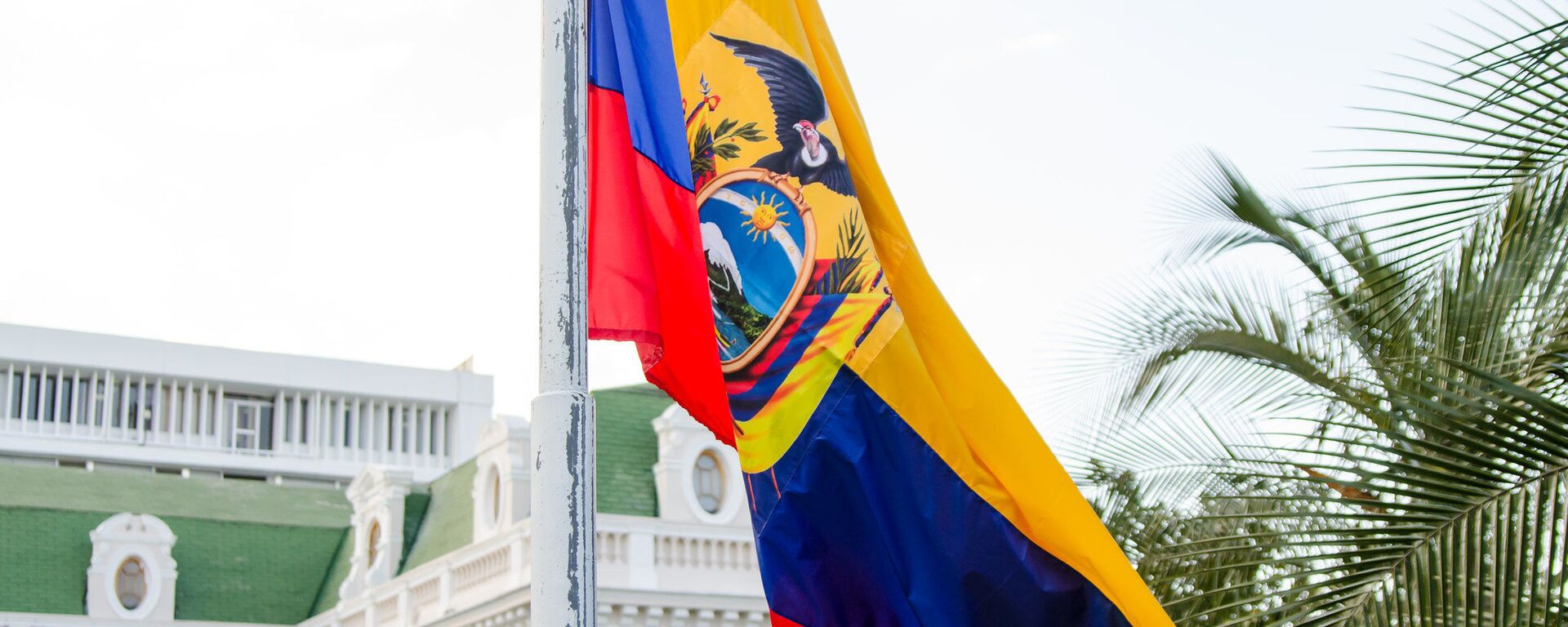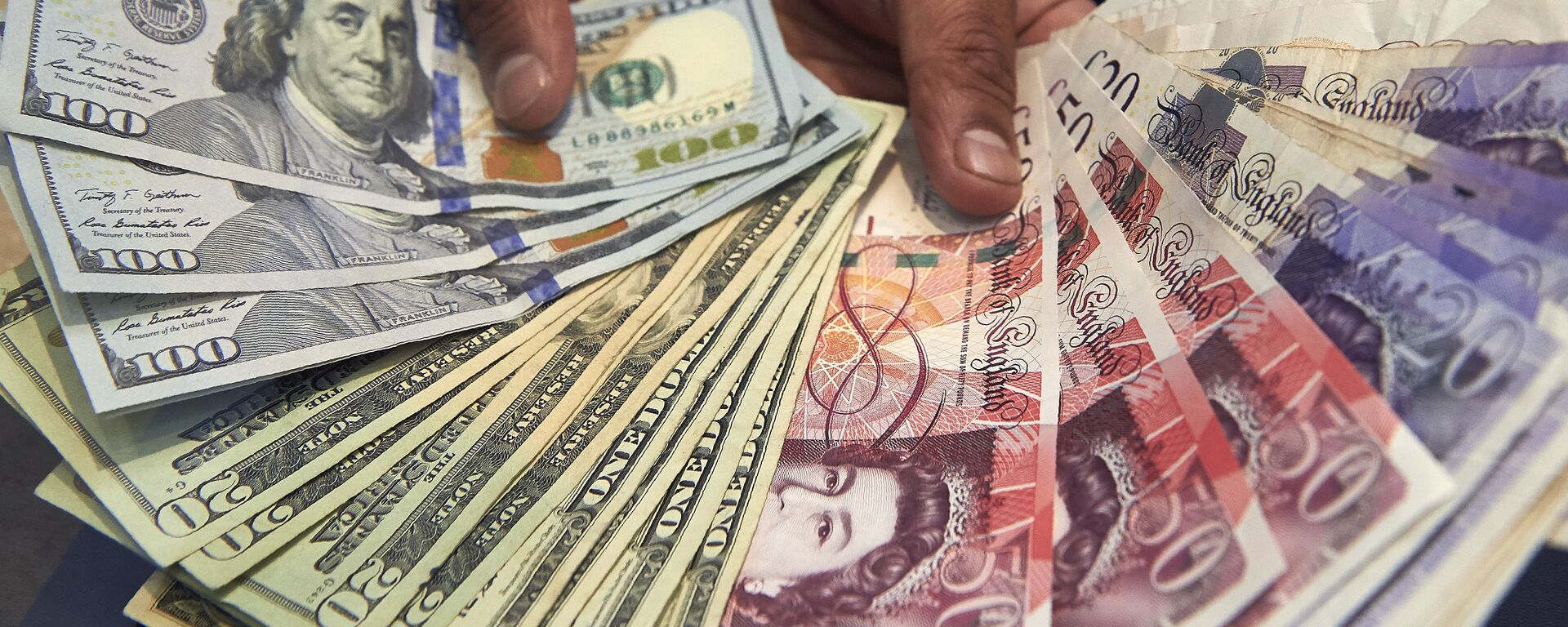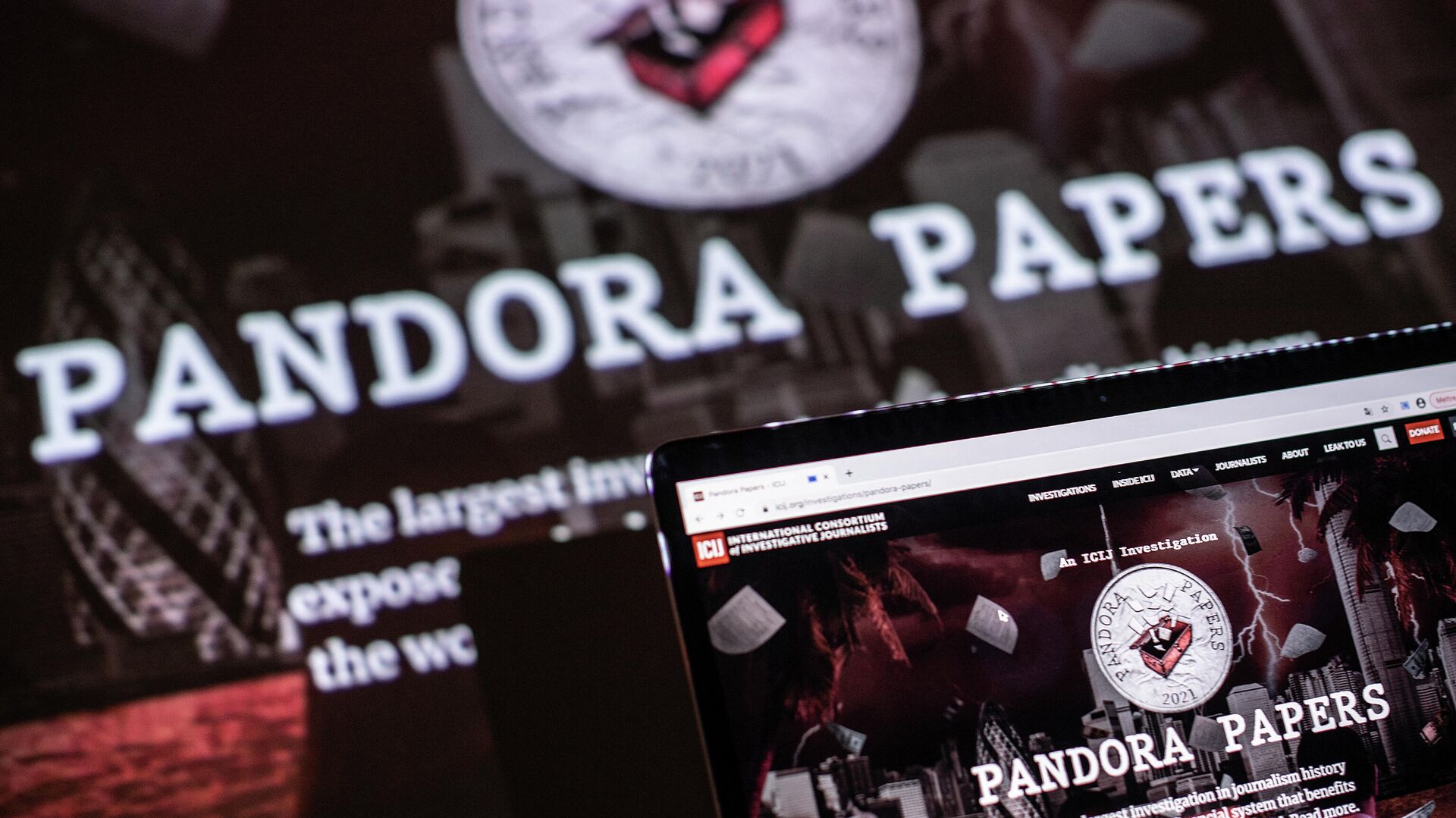https://sputnikglobe.com/20211004/whos-behind-the-pandora-papers-leaks-of-politicians-offshore-assets-1089633412.html
Who's Behind the 'Pandora Papers' Leaks of Politicians' Offshore Assets?
Who's Behind the 'Pandora Papers' Leaks of Politicians' Offshore Assets?
Sputnik International
The latest “Big Nothingburger” from the well-funded team behind the 2016 Panama Papers is heavy on the sauce, but thin on meat. But that hasn't stopped the... 04.10.2021, Sputnik International
2021-10-04T15:56+0000
2021-10-04T15:56+0000
2021-10-05T10:26+0000
international consortium of investigative journalists (icij)
offshore tax havens
panama papers
pandora papers
https://cdn1.img.sputnikglobe.com/img/07e5/0a/05/1089676663_0:250:3071:1977_1920x0_80_0_0_bb9c0f93bd5a4b1f366727e4bba099d8.jpg
The latest round of "leaks" of the offshore accounts and assets of the rich and famous may have caused a few red faces, but it is unlikely to land anyone in jail. So what motivated the International Consortium of Investigative Journalists (ICIJ) to release the so-called Pandora Papers?The ICIJ's online "Offshore Leaks Database" comes with a disclaimer admitting that keeping money or assets in offshore tax havens is not even a crime."There are legitimate uses for offshore companies and trusts. We do not intend to suggest or imply that any people, companies or other entities included in the ICIJ Offshore Leaks Database have broken the law or otherwise acted improperly", it reads.Indeed, statistics from Her Majesty's Revenue and Customs — the UK tax man — show that around one in ten British people have some kind of "offshore financial interest".But the site nevertheless features a line-up of current and former world leaders' financial dealings for the titillation of readers.The Usual SuspectsThose "exposed" in the latest bundle of leaks include dignitaries from a raft of developing nations as well as those who have recently fallen out of favour in the West. Various loose acquaintances of Russian President Vladimir Putin are predictably flagged up, along with advisers to former US President Donald Trump.Czech Prime Minister Andrej Babis is a prominent target. Babis has resisted the European Union's demands for his country to accept a quota of illegal immigrants crossing the Mediterranean, caused by the US-backed regime-change efforts in Libya and Syria. His government also has the general support of the still-significant Communist Party of Bohemia and Moravia.Three current and 11 former Latin American presidents, along with several African leaders, including Kenyan President Uhuru Kenyatta, are also tarred with the Pandora Papers brush.Tony Blair was a surprise addition to the list, although the ICIJ's sketch portrait of him was so far from a likeness that the former British prime minister wouldn't be recognised standing next to his own wanted poster.Blair's foundation issued a rebuttal of the claims that he and his wife Cherie, a barrister and crown court judge, avoided paying stamp duty tax on property transactions by registering them offshore. Another new face was Ukrainian President Volodymyr Zelensky, nominally a Western ally. But Zelensky has fallen out of favour in Washington after former White House occupant Donald Trump asked him to investigate current President Joe Biden's suspicious dealings in the country. Where Do They Get It From?The ICIJ website invites would-be whistleblowers to leak information to their journalists. The Pandora series claims to have inside info on 14 companies operating in 38 jurisdictions, whereas the Panama Papers of 2016 were based solely on the records of now-defunct Panamanian legal firm Mossack Fonseca. But, in fact, much information on offshore holdings is in the public domain. In the US, UK, and Australia, it has been compulsory for the past decade to register offshore assets with tax authorities, on pain of prosecution. Those three countries share that information to help combat tax evasion.The UK's Sanctions and Anti-Money Laundering Act of 2018 mandated the creation of a publicly-accessible register of offshore interests, which anyone can delve into. The Grayzone editor Max Blumenthal bluntly called the latest ICIJ release a "hack-and-dump" by US intelligence agencies.Follow the Money But who is paying the ICIJ's team of 240 journalists to pore through records of offshore assets? The body's financial backers include the Adessium Foundation, Open Society Foundations (OSF), The Sigrid Rausing Trust, The Ford Foundation, Fritt Ord Foundation, and the Pulitzer Centre on Crisis Reporting, along with Australian media mogul Graeme Wood.OSF is the vehicle for Hungarian-born, anti-communist billionaire George Soros to fund NGOs around the world which have been accused of aiding regime change efforts in a number of countries.Dutch-based Adessium funds Bellingcat, an organisation that has issued regular briefings accusing the Syrian government and its allies of war crimes, while foreign powers including the US and Turkey continue to support armed militant groups.The Ford Foundation was set up in 1936 by auto industry tycoon Henry Ford and his son Edsel, nine years after the elder Ford had ceased publishing his anti-Semitic newspaper The Dearborn Independent in the face of lawsuits. The foundation's overseas operations included the West Berlin-based Fighting Group Against Inhumanity, a CIA front that conducted espionage and sabotage operations in East Germany.The Fritt Ord Foundation bestows an annual free speech award, whose previous recipients included leaders of the 1989 revolutions in Eastern Europe, including Poland's Lech Walesa.Fritt Ord also funds the Soros-connected Human Rights Foundation (HRF), whose founder Thor Halvorssen Mendoza is the cousin of Venezuelan opposition Popular Will party leader Leopoldo Lopez Mendoza. Lopez was jailed in 2015 for inciting deadly violence in the 2014 Guarimba riots against the United Socialist Party government. HRF's chairman Garry Kasparov is also a militant opposition figure in his native Russia.The Sigrid Rausing Trust is a funder of Hope not Hate (HnH), originally an anti-fascist organisation which now promotes claims that China is perpetrating a "genocide" of ethnic Uyghur Muslims in the north-western Xinxiang province. HnH wrote in an article on Friday that the Winter Olympics in Beijing in February 2022 should be dubbed "the Genocide Games".
https://sputnikglobe.com/20211003/pandora-papers-feature-3-current-11-former-latin-american-presidents-report-says-1089632985.html
https://sputnikglobe.com/20211003/pandora-papers-exposing-secrets-of-world-leaders-released-1089631074.html
Sputnik International
feedback@sputniknews.com
+74956456601
MIA „Rossiya Segodnya“
2021
James Tweedie
https://cdn1.img.sputnikglobe.com/img/07e4/08/1c/1080307270_0:3:397:400_100x100_80_0_0_7777393b9b18802f2e3c5eaa9cbcc612.png
James Tweedie
https://cdn1.img.sputnikglobe.com/img/07e4/08/1c/1080307270_0:3:397:400_100x100_80_0_0_7777393b9b18802f2e3c5eaa9cbcc612.png
News
en_EN
Sputnik International
feedback@sputniknews.com
+74956456601
MIA „Rossiya Segodnya“
Sputnik International
feedback@sputniknews.com
+74956456601
MIA „Rossiya Segodnya“
James Tweedie
https://cdn1.img.sputnikglobe.com/img/07e4/08/1c/1080307270_0:3:397:400_100x100_80_0_0_7777393b9b18802f2e3c5eaa9cbcc612.png
international consortium of investigative journalists (icij), offshore tax havens, panama papers
international consortium of investigative journalists (icij), offshore tax havens, panama papers
Who's Behind the 'Pandora Papers' Leaks of Politicians' Offshore Assets?
15:56 GMT 04.10.2021 (Updated: 10:26 GMT 05.10.2021) The latest “Big Nothingburger” from the well-funded team behind the 2016 Panama Papers is heavy on the sauce, but thin on meat. But that hasn't stopped the media from running wild with claims of shady dealings by leaders from the developing world and Eastern Europe.
The latest round of "leaks" of the offshore accounts and assets of the rich and famous may have caused a few red faces, but it is unlikely to land anyone in jail. So what motivated the International Consortium of Investigative Journalists (ICIJ) to release the so-called Pandora Papers?
The ICIJ's online "Offshore Leaks Database" comes with a disclaimer admitting that keeping money or assets in offshore tax havens is not even a crime.
"There are legitimate uses for offshore companies and trusts. We do not intend to suggest or imply that any people, companies or other entities included in the ICIJ Offshore Leaks Database have broken the law or otherwise acted improperly", it reads.
Indeed, statistics from Her Majesty's Revenue and Customs — the UK tax man — show that around
one in ten British people have some kind of "offshore financial interest".
But the site nevertheless features a line-up of current and former world leaders' financial dealings for the titillation of readers.
Those "exposed" in the latest bundle of leaks include dignitaries from a raft of developing nations as well as those who have recently fallen out of favour in the West. Various loose acquaintances of Russian President Vladimir Putin are predictably flagged up, along with advisers to former US President Donald Trump.
Czech Prime Minister
Andrej Babis is a prominent target. Babis has resisted the European Union's demands for his country to accept a quota of illegal immigrants crossing the Mediterranean, caused by the US-backed regime-change efforts in Libya and Syria. His government also has the general support of the still-significant Communist Party of Bohemia and Moravia.
Three current and 11 former
Latin American presidents, along with several African leaders, including Kenyan President Uhuru Kenyatta, are also tarred with the Pandora Papers brush.
Tony Blair was a surprise addition to the list, although the ICIJ's
sketch portrait of him was so far from a likeness that the former British prime minister wouldn't be recognised standing next to his own wanted poster.
Blair's foundation issued a rebuttal of the claims that he and his wife Cherie, a barrister and crown court judge,
avoided paying stamp duty tax on property transactions by registering them offshore.
Another new face was Ukrainian President Volodymyr
Zelensky, nominally a Western ally. But Zelensky has fallen out of favour in Washington after former White House occupant Donald Trump asked him to investigate current President Joe Biden's suspicious dealings in the country.

3 October 2021, 18:47 GMT
Where Do They Get It From?
The ICIJ website invites would-be whistleblowers to leak information to their journalists. The Pandora series claims to have inside info on 14 companies operating in 38 jurisdictions, whereas the Panama Papers of 2016 were based solely on the records of now-defunct Panamanian legal firm Mossack Fonseca.
But, in fact, much information on offshore holdings is in the public domain. In the US, UK, and Australia, it has been compulsory for the past decade to register offshore assets with tax authorities, on pain of prosecution. Those three countries
share that information to help combat tax evasion.
The UK's Sanctions and Anti-Money Laundering Act of 2018 mandated the creation of a publicly-accessible
register of offshore interests, which anyone can delve into.
The Grayzone editor Max Blumenthal bluntly called the latest ICIJ release a "hack-and-dump" by US intelligence agencies.
But who is paying the ICIJ's team of 240 journalists to pore through records of offshore assets?
The body's financial backers include the Adessium Foundation, Open Society Foundations (OSF), The Sigrid Rausing Trust, The Ford Foundation, Fritt Ord Foundation, and the Pulitzer Centre on Crisis Reporting, along with Australian media mogul Graeme Wood.
OSF is the vehicle for Hungarian-born, anti-communist billionaire
George Soros to fund NGOs around the world which have been accused of aiding regime change efforts in a number of countries.
Dutch-based Adessium funds Bellingcat, an organisation that has issued regular briefings accusing the Syrian government and its allies of war crimes, while foreign powers including the US and Turkey continue to support armed militant groups.

3 October 2021, 16:35 GMT
The Ford Foundation was set up in 1936 by auto industry tycoon Henry Ford and his son Edsel, nine years after the elder Ford had ceased publishing his anti-Semitic newspaper The Dearborn Independent in the face of lawsuits. The foundation's overseas operations included the West Berlin-based Fighting Group Against Inhumanity, a CIA front that conducted espionage and sabotage operations in East Germany.
The Fritt Ord Foundation bestows an annual free speech award, whose previous recipients included leaders of the 1989 revolutions in Eastern Europe, including Poland's Lech Walesa.
Fritt Ord also funds the Soros-connected Human Rights Foundation (HRF), whose founder Thor Halvorssen Mendoza is the cousin of Venezuelan opposition Popular Will party leader Leopoldo Lopez Mendoza. Lopez was jailed in 2015 for inciting deadly violence in the 2014 Guarimba riots against the United Socialist Party government. HRF's chairman Garry Kasparov is also a militant opposition figure in his native Russia.
The Sigrid Rausing Trust is a funder of Hope not Hate (HnH), originally an anti-fascist organisation which now promotes claims that China is perpetrating a "genocide" of ethnic Uyghur Muslims in the north-western Xinxiang province. HnH wrote in an article on Friday that the Winter Olympics in Beijing in February 2022 should be dubbed "the Genocide Games".





